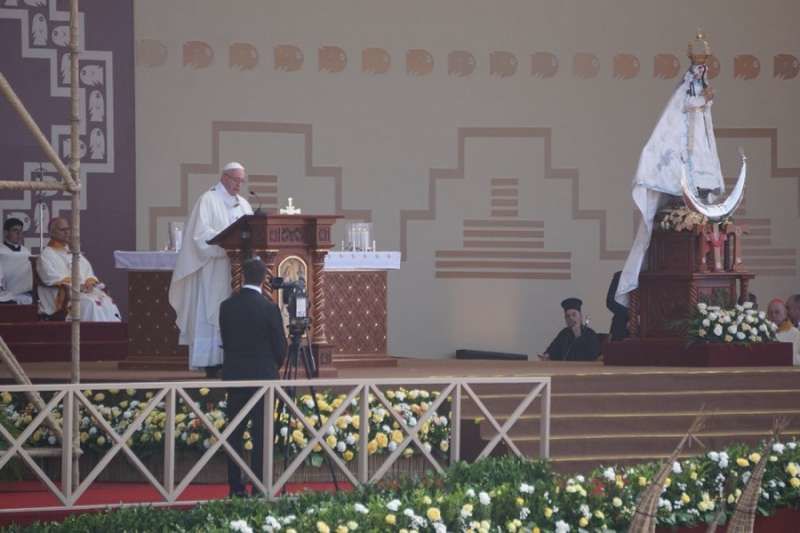In a homily Saturday, Pope Francis spoke about the natural disasters Peru experienced over the last year, praising the way in which Peruvians joined together to help one another during these difficult moments.
“I know that, in the time of darkness, when you felt the brunt of the [storm], these lands kept moving forward,” the Pope said during Mass near Trujillo, Peru Jan. 20.
Like the five wise virgins in the parable in the day's Gospel, the people of Peru were prepared with “the oil needed to go out to help one another like true brothers and sisters,” he continued. “You had the oil of solidarity and generosity that stirred you to action, and you went out to meet the Lord with countless concrete gestures of support.”
The Mass, which took place in Huanchaco, a beach town outside the city of Trujillo, was part of Pope Francis’ Jan. 18-21 visit to Peru.
In his homily he referred to the “Niño,” or “Coastal El Niño,” the name given to a weather phenomenon off the coast of Peru and Ecuador, which began in December 2016.
The pattern caused warmer-than-usual water temperatures off the coasts of the two countries, which in turn triggered heavy rainfalls in the mountains.
The excess run-off from the rains caused severe flooding and mudslides, devastating parts of Peru, particularly in the north. Trujillo, Peru’s third most populated city, was one of the worst hit after a period of heavy rains last March caused mudslides and flooding directly affecting around 800,000 people and killing almost 100.
Francis encouraged Peruvians not to lose heart during these times of trials, but to use this Eucharistic celebration as an opportunity to unite their suffering to Christ’s suffering on the cross.
“These times of being ‘buffeted,’” he said, “call into question and challenge our strength of spirit and our deepest convictions. They make us realize how important it is to stand united, not alone, and to be filled with that unity which is a fruit of the Holy Spirit.”
Many people are still suffering from the damage caused by “Coastal El Niño,” the Pope noted. And it’s possible these difficulties have caused their faith to waver.
If this is the case, “we want to unite ourselves to Jesus,” he said, because “[Jesus] knows our pain and our trials; he endured the greatest of sufferings in order to accompany us in our own trials. The crucified Jesus wants to be close to us in every painful situation, to give us a hand and to help lift us up.”
Like the story of the ten virgins in the Gospel reading, who were surprised by the bridegroom’s arrival in the middle of the night, the storms of life – both the physical storms as well as other difficulties – can catch us off-guard.
In the passage, we learn that five of the virgins were prepared with oil for their lamps and five were not. “At the appointed time, each of them showed what they had filled their life with,” Francis noted, and “the same thing happens to us.”
“There are times when we realize what we have filled our lives with. How important it is to fill our lives with the oil that lets us light our lamps in situations of darkness and to find the paths to move forward!”
He commended the Peruvians for being well-prepared with the grace of the Holy Spirit, so that “in the midst of darkness, you, together with so many others, were like living candles that lighted up the path with open hands, ready to help soothe the pain and share what you had, from your poverty, with others.”
“Fill your lives always with the Gospel,” he concluded. “I want to encourage you to be a community that lets itself be anointed by the Lord with the oil of the Spirit. He transforms, renews and strengthens everything.”
Interested in more? Subscribe to Angelus News to get daily articles sent to your inbox.

